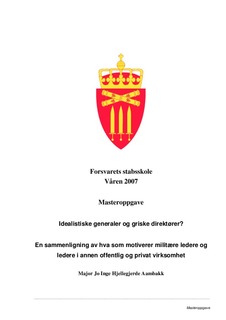| dc.description.abstract | This study contributes to our understanding of differences in work motivation between executives in the military, public and private sectors in Norway. I have found scattered empirical studies that deals with leadership and leaderbehaviour in the Norwegian Defence, and especially studies that compare military leadership and leadership in the civilian society. As far as I know there are no empirical coparisons between military and civilian leadership in Norway. The problem I have addressed in this masterstudy is: To what extent are executives in the Norwegian Defence more motivated by intrinsic factors compared to executives in civilian (public and private) sectors? My theoretical basis for the study are the sociological theories of Samuel P. Huntington and Morris Janowitz regarding military officers and the military profession. Huntington speaks of three essential elements in military profesionalism: expertise, responsibility and corporateness (Huntington, 1985). Janowitz (1971), on the other hand, argues among other things that there are increased integration between the military and the society. This lead to officers with more equal attitudes and values like we can see in the society. I have had data from a survey of 2181 private sector and 790 public sector executives in Norway. This data is regarded as representative for all leaders in Norway (Colbjørnsen, 2004). In addition, I have performed a similar survey among executives in the Norwegian Defence which include 1018 military and 179 civilian respondents. I can summarize my findings in the following five mainpoints: 1. It is surprisingly minor differences what executives place emphasis on between military and civilian sector. I find few traces of a peculiar “military culture” in my findings. 2. Topexecutives place more emphasis on intrinsic motivation than middle managers in all sectors. The Topexecutive officers put similliar emphasis than other public topexecutives on the oppurtunity to make “contributions to important decisions” that can “benefit the society”. The Topexecutives in private sector place more emphasis on the personal benefits, and less on contributions that can “benefit the society”. 3. Officers who are middlemanagers put foremost emphasis on the possibility to combine the work with their personal life, have professional challeging collegues, attractive place of work, large freedom to decide themselves how to work, and a superior who can encourage, inspire and support. Jo Inge H. Aambakk Side 4 av 85 Masteroppgave 4. Military executives are different from executives in civilian sector in the importance of emphasis on collegues both professional and in a friendly spirit. The strong “espirit de corps” with close social ties to their collegues seems to be values which are institutional among executives in the Norwegian Defence. 5. Intrinsic motivation might reduse turnover. Initiative which can contribute to strengthen the intrinsic motivation can have positive impact for the organizations, and make them more competitive in keeping their employees | en_US |
